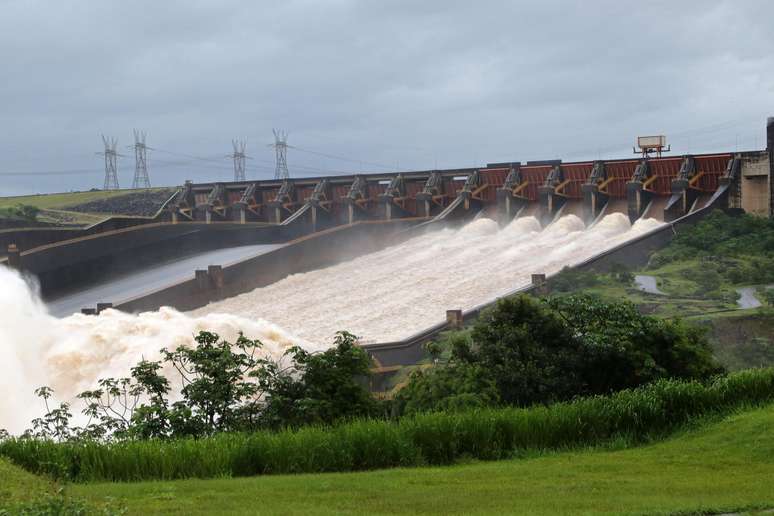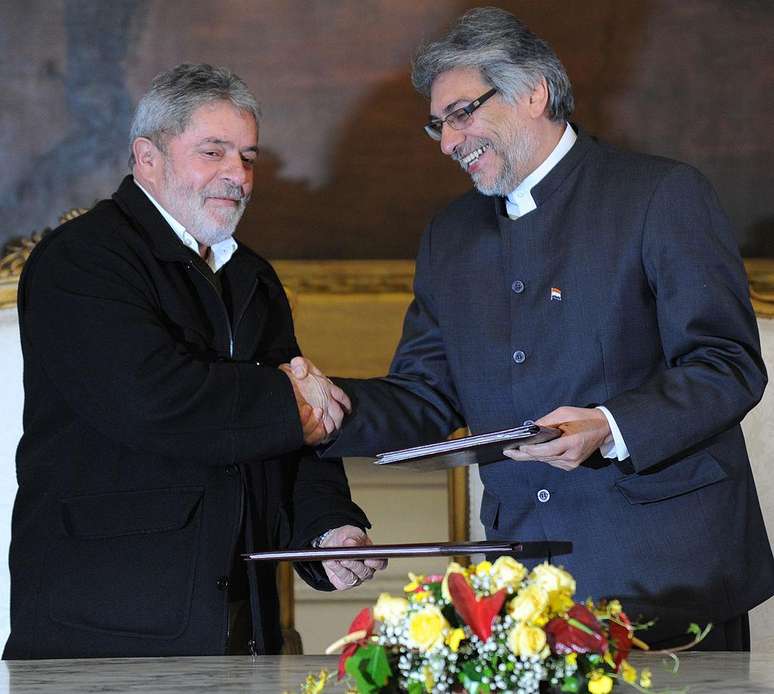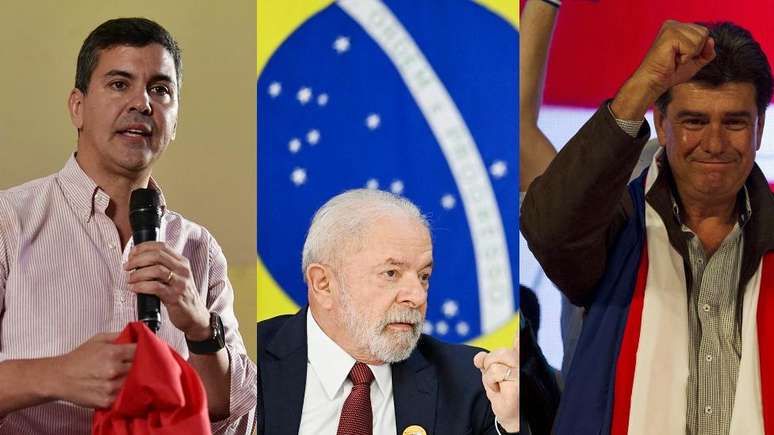In the assessment of the experts, the arrival of Lula to the presidency is the main factor that should determine the progress of relations between the two countries.
General elections that will elect Paraguay’s next president will be held on April 30.
Unlike Brazil, the neighboring country does not have a second round and does not allow re-election: the candidate who gets the most votes is elected for a single term.
Candidates Efraín Alegre, of the Liberal Party, and Santiago Peña, of the Colorado Party, face a technical tie in voting intentions, with 38 percent and 36 percent, respectively, according to the latest Atlas poll, released on March 14. In third place, with 14%, is Payo Cubas, of the Cruzada National Party.
The election of a new head of state opens a new chapter in the history of bilateral cooperation between Brazil and Paraguay, an important trading partner of Brazil.
Specialists interviewed by BBC News Brasil believe whoever wins on April 30, the course of relations should not be altered, but believe the relationship will be heightened by the greater closeness that Lula’s return to Brazil’s office can bring to his neighborhood. .
The expectation is that Lula will yield, at least in part, to economic agreements to the advantage of Paraguay, above all in the distribution of the energy generated by the Itaipu hydroelectric plant.
The distribution of energy from Itaipu is a central point of Paraguayan foreign policy

The distribution of electricity produced by the Itaipu hydroelectric plant between the two countries is a constant topic of debate by Paraguayans.
Because Paraguay has a much smaller economy than Brazil, the country consumes only a fraction of its half and sells the rest to Brazil, through Eletrobras.
Therefore, the current agreement stipulates that Brazil receives 85% of the energy produced, while Paraguay retains the remaining 15%.
The price that Brazil pays for excess energy is considered low compared to the values practiced in the international energy market – and this is precisely one of the central points of the elections underway at the end of April.
“Paraguayans speak of an 80% price gap. There is a lot of link between Itaipu’s solution and the improvement of health, education and infrastructure. There is a direct link between Itaipu and state capacity Paraguayan to provide public goods to the population,” says Pedro Feliú, a professor at USP and a specialist in Paraguayan politics.
In an interview with CBN radio, Peña said the intention is to raise more funds to increase transmission and distribution lines and create jobs. “The same thing happened in Brazil in the 70s, 80s and 90s with the energy Itaipu generated for Brazil. Now Paraguay wants the same thing. see how it can generate resources so that Paraguay has the strength to move in the next five years”.
Efraín Alegre has also said in interviews that he does not consider the current division negotiated with Brazil fair.
In 2019, an agreement that provided for the purchase of energy by Paraguay on conditions deemed unfavorable to the country even resulted in a threat of impeachment to President Mario Abdo, of the Colorado party, who ended up not consolidating the negotiation with the government of Jair Bolsonaro, President of Brazil at the time.
Pedro Feliú assesses that the episode – and the current interests of the neighboring country – distance the current presidential candidates from a “surrender” position.
“From an electoral point of view, both Efraín Alegre and Santi Peña do not have a great impact in terms of positions in the negotiations, but that does not mean that the result of the negotiations on Annex C goes in the direction wanted by Paraguay. transmission lines to generators, for energy distribution… So Paraguay’s energy sovereignty collides with the country’s infrastructure.”
The figure of Lula as an ally of the neighbors

In an interview with journalist Jairo Eduardo, of CBN Cascavel, in February of this year, the candidate Santiago Peña said that Lula has already shown great generosity towards Paraguay in the past by increasing the price of the share ceded by Paraguay in the agreement on the Itaipu plant – something, according to him, allowed resources to be used in education.
“The memory Paraguay has of Lula’s government is very good. It is with the same vision that we look to the future of bilateral relations between Paraguay and Brazil”.
Pedro Brites, professor of international relations at the FGV (Faculdade Getúlio Vargas), points out that Lula’s willingness to conclude agreements that have satisfied his neighbors in the past is remarkable.
“In the first two terms, he tried to build relations that were not so unequal with Paraguay and now there is an expectation that Brazil recognizes that there is a chasm in the conditions in which Paraguay needs to be able to access its part of the ‘agreement. “
According to Brites’ analysis, even if Paraguay maintains a more conservative government, such as that of the Colorado Party, which has been in power for a long time and has a more right-wing or center-right orientation, the country gains more under the Lula government , which offers a breakthrough in the level of regional coordination and level of regional integration.
In the Bolsonaro government, the professor recalls, there were few initiatives and new economic proposals that interested Paraguayans, and the former president withdrew Brazil from Unasur (Union of South American Nations), a decision that was overturned by Lula.
“I think this is also manifested in the way Brazil has addressed the issue of the Paraguayan elections and defending the idea that Paraguay should continue to be autonomous, also because Brazil is betting a lot on building a Mercosur reinvigorated by the return now recent by Unasur.As a regional leader, Brazil is expected to build a space for effective dialogue with its neighbors, especially its poorer neighbors, who are generally the ones with whom it will be necessary to build more structured relationships around cooperation or development support to try to prevent them from drifting away from the integration process”.
The Paraguayan economy depends on Brazil
“If we look at our commercial partnerships, Paraguay is the only country in the world where we can say that it really depends on Brazil,” says Pedro Feliú.

Brazil is the main destination of Paraguayan exports, which send agricultural products to their neighbor, contributing to the domestic food supply and the export of these products to other countries.
On the other hand, some of the main products exported from Brazil to Paraguay are: petroleum and its derivatives, chemicals, vehicles, machinery and equipment, textiles and food products such as meat, sugar and coffee.
Trade relations between the two countries benefit from geographical proximity and regional integration through Mercosur.
“What I observed from the candidates’ attitude is a common goal of keeping relations with Brazil on a positive basis. Brazil is too important for the country’s economy, so it would be very risky to try to build some kind of transformation in that sense country that could jeopardize this special relationship,” stresses Brites.
In Professor FGV’s assessment, the Lula government must carefully observe the movement towards rapprochement between Paraguay and China. “I don’t think it’s an immediate threat, but the fear is that this will divert the neighboring country a bit from trade relations with Brazil and that it will upset Mercosur.
Source: Terra
Rose James is a Gossipify movie and series reviewer known for her in-depth analysis and unique perspective on the latest releases. With a background in film studies, she provides engaging and informative reviews, and keeps readers up to date with industry trends and emerging talents.







